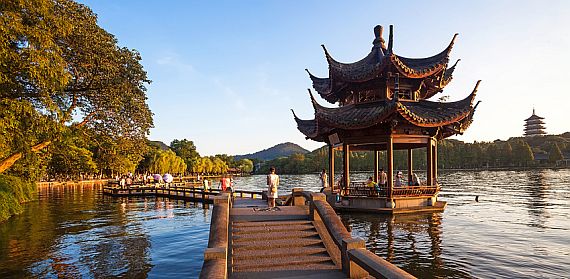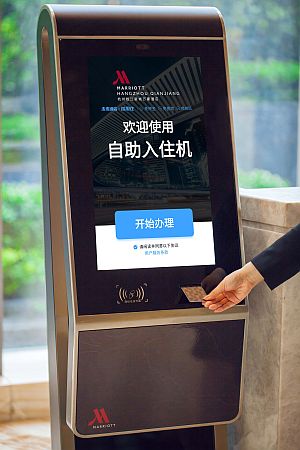 |
|
China's West Lake, a place to think about the past and the present. / photo: View Stock adobe.stock |
Hamburg (April 12, 2019). In Hangzhou, the capital of Zhejiang province in East China and previously the home of Marco Polo during his stay in China, it is easy to get the impression that face-recognition is the key to the future of hotel and restaurant services. hospitalityInside's new column "China Inside" reflects West Lake, one of the most desired tourist attractions in China where history has turned into an Alibaba hot spot.
Alibaba's home is Hangzhou, so FlyZoo, the "Future Hotel" where "Tmall Genie" computer and robots have replaced receptionist and concierge, is located inside the giant Qin Cheng Li shopping center, which is inside Ali Park, which is also housing the headquarter of Alibaba.
The name of the shopping center translates as roughly as "Traditional orange shopping street of Alibaba customers" – orange being the colour of Alibaba's logo. Also in Hangzhou one can find two Marriott Hotels, which accept via the Fliggy App using face recognition for check-in, lift security and as room key. Fliggy, needless to say, is the travel company of Alibaba and payment is made with Alipay, the mobile payment system of Alibaba's affiliate company Ant Financial. In 2017 the first "Smile to Pay" fast food restaurant in China, run by Ant Financial, which uses face-recognition for payment was opened – you guessed it – in Hangzhou as well.
In Imperial times, even long before Marco Polo came to Hangzhou, hospitality and travelling had developed a long and distinctively positive tradition. Mobility was crucial for scholars and administrators, but also for monks and pilgrims in ancient times. Travelling was seen as an ideal way to better understand not only the nature of the world, but also of oneself.
 |
|
| Everyday life today: Checkin by face recognition in the Marriott Hotel in Hangzhou. / photo: Marriott |
Buildings block the vistas
Self-recognition took center stage among the travel motives, especially in the form of the experience of the majestic vastness of landscapes against the smallness and utter unimportance of oneself. Chinese inkbrush paintings often depict a tiny human figure wandering through misty mountains or sitting in a tiny hut. For more refreshing overnight stays, temples in the countryside and inns offered sophisticated hospitality.
Hangzhou used to be famous for the West Lake and the vistas it offered into the surrounding hills. The lake is still existing, albeit nowadays so full of tourist pleasure boats that the water almost disappears from site, but the vistas are all blocked by high-rise buildings, many of them hotels offering views down onto the lake, mostly for domestic guests.
No surprise, also historically the journeys of most Chinese people only happened within the Chinese territory. Trips abroad were indeed very rare and not considered as necessary. Chinese had no religion to preach as missionaries, no lust for gold to be robbed from people in faraway places and saw no need to search for knowledge outside of China, with the exception of some Buddhist monks fetching Sutras from India. No Gilgamesh or Sinbad, no Marco Polo or Ibn Battuta and no Sir Francis Drake or Charles Darwin provided role models for Chinese travelling abroad.
There is only one exception: The Chinese admiral Zheng He, who in the 15th century commanded a fleet of 200 ships, which travelled in seven voyages not only to Southeast and South Asia, but also reached Mombasa, Mecca and Hormuz.
Chinese don't say Thank you
While travelling for Chinese still is a form of education, hospitality is a virtue. "What a joy it is to welcome friends coming from afar!" are the opening words of the Analects, the main collection of texts attributed to Confucius, written 2,500 years ago. Today, Chinese tourists often view themselves as "friends coming from afar", and expect to receive a warm welcome and to be treated with respect.
In a commercial setting, hospitality is provided as paid services, and accordingly Chinese guests demand a level of customers' service at least as high as for guests from other countries, without seeing the need to thank for it. Hotel and restaurant front staff, waiting for a smile and a "Thank you" for mundane services like handing out the room key, better start to accept the fact that most Chinese guests see no need for such behaviour. Get used to it and remember that the Chinese guests (hopefully) help the company to thrive.
Information provided by CTT China Tourism Training Hospitality, the global standard training for hospitality service providers for the Chinese outbound market, developed by COTRI China Outbound Tourism Research Institute and The Hong Kong Polytechnic University, School of Hotel and Tourism Management (more information at https://china-outbound.com/china-tourism-training/). / kn


